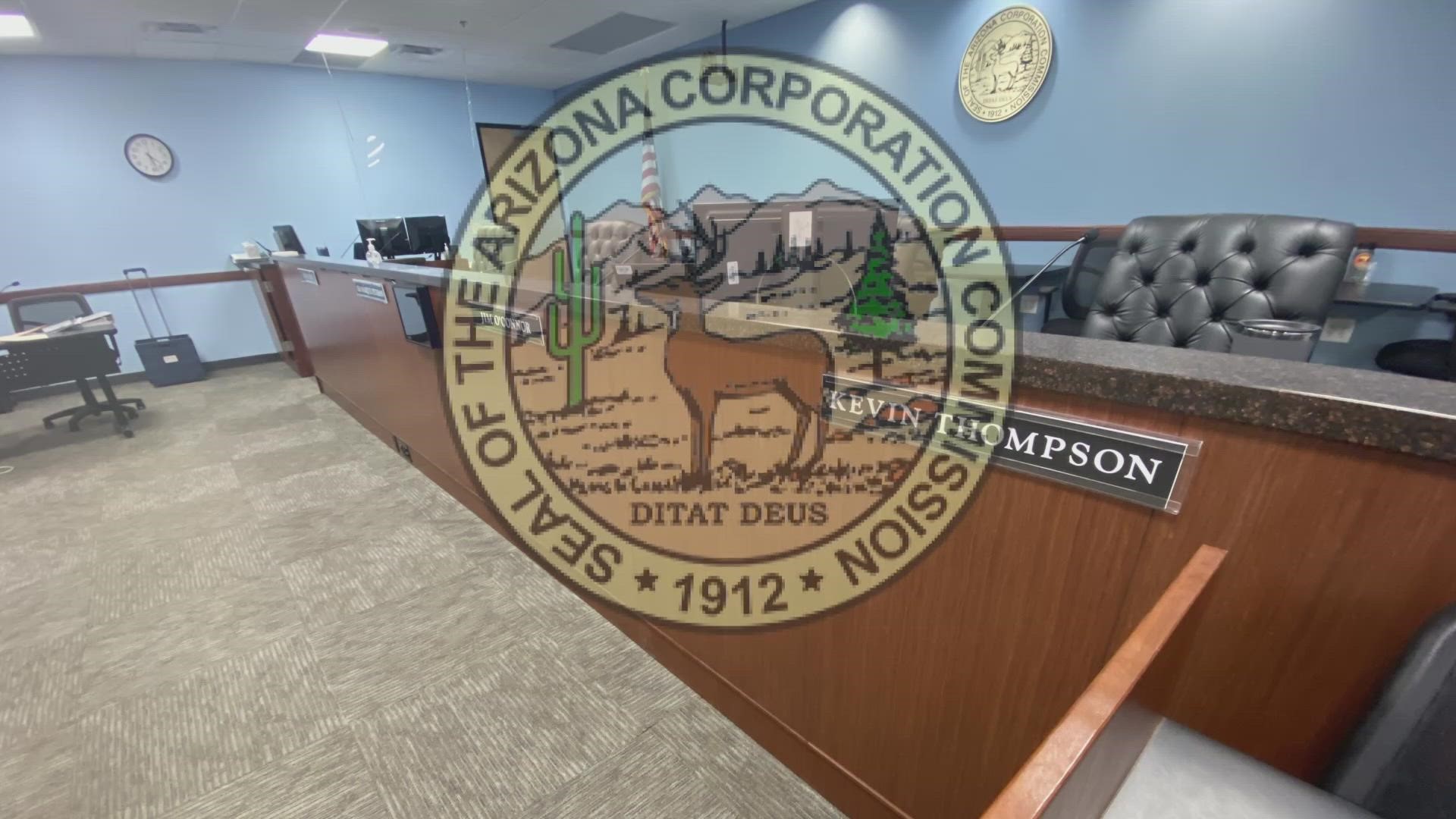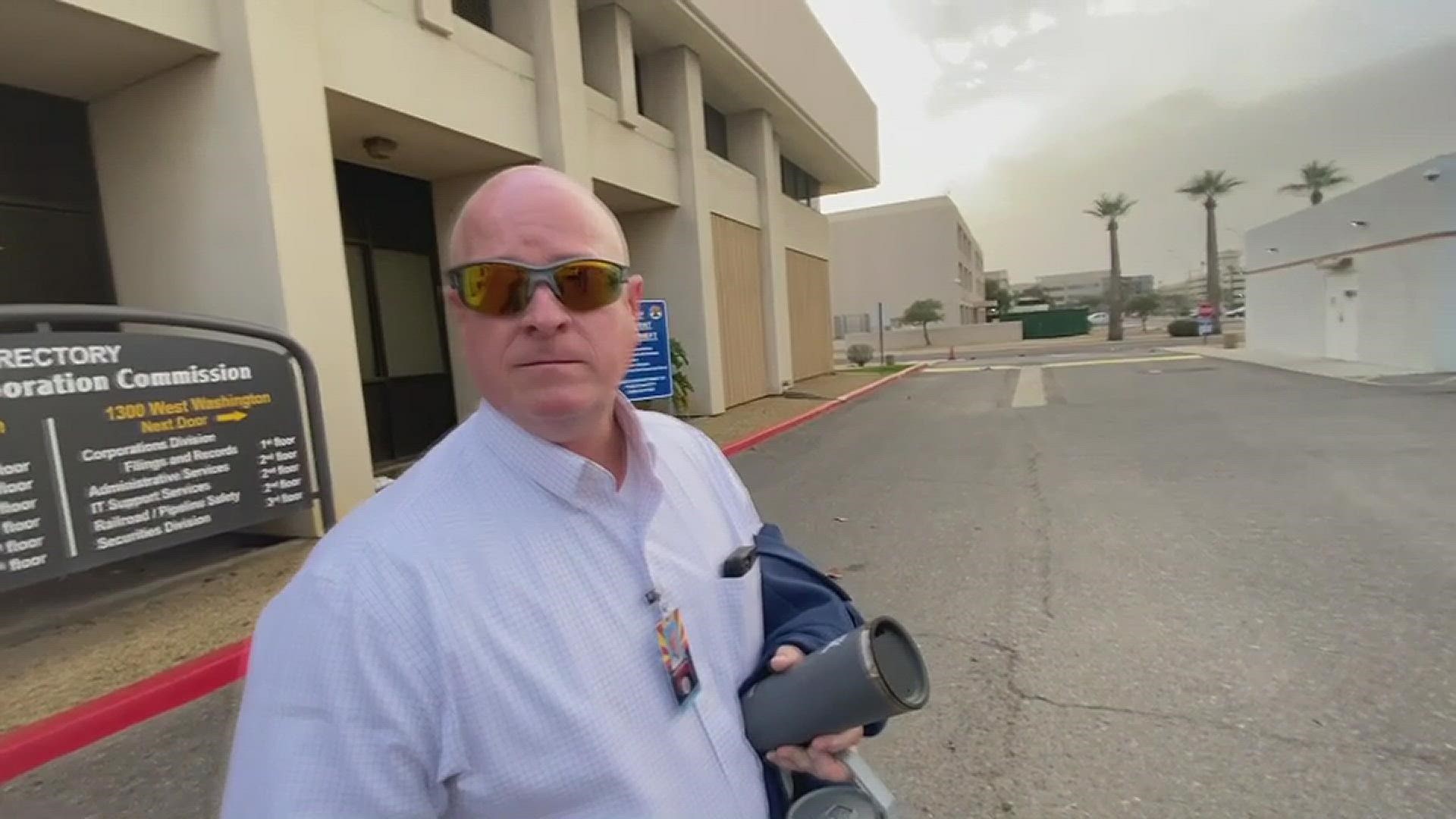PHOENIX — A prominent association representing utility commissioners across the country said its name was falsely used to promote a two-day event hosted by the American Gas Association (AGA) in New York in January.
The revelation, uncovered by 12News, contradicts a statement filed by Corporation Commissioner Kevin Thompson in response to an ethics complaint.
A spokesperson for Thompson told 12News in an email Friday the commissioner will submit an amended filing to clarify the matter and he maintains his attendance at the New York meetings was appropriate. The AGA, which represents 200 natural gas companies in the U.S., said it is to blame for the false representation.
Why it matters
Citizens have a right to know who their elected officials meet with and under what circumstances they attend those meetings. Corporation commissioners are especially influential because there are just five of them, making up a powerful fourth branch of state government. Their votes impact utility bills, the environment, consumer rights and a host of other aspects to life in Arizona.
The commission’s code of ethics states commissioners should not communicate with individuals "representing an industry … whose interests will be affected by Commission decisions, and whose intent is to influence any decision, legislation, policy, or rulemaking within the Commission’s jurisdiction.”
Critics of private meetings between commissioners and investors include former Corporation Commissioner Bob Burns.
“If a rate case is in process, you run into ex-parte issues. The investors are going to want the best return on their investment. It’s only natural you shouldn’t be dealing with one side if the other side is not present, and any such meeting definitely should be in a public forum,” said Burns, a Republican known for pushing for transparency when he served on the commission.
APS and TEP have rate cases before the commission and are seeking higher rates. Financial outfits Thompson visited invest in those utilities.
Conversely, many regulators encourage dialogue between commissioners and investors under the right circumstances. Thompson, a former manager and lobbyist at Southwest Gas, said the meetings were beneficial to the public because it’s the job of commissioners “to reassure there’s regulatory stability in Arizona.”
Meals, meetings and a reception
Thompson first attracted scrutiny after he posted a message on social media in late January saying he met with the banks and financial analysts.
On Friday, the AGA provided 12News a copy of what a spokesperson said was the agenda for the New York meetings referenced by Thompson.
The 2-day itinerary included meals at restaurants and shuttled trips to financial outfits like Morgan Stanley, Credit Suisse, and Standard & Poor’s. It depicted one-hour meetings over two days with analysts and bank executives across New York City. A reception and dinner at Osteria La Baia on the second night featured finance executives including Fitch Ratings Director Julie Jiang, BMO Capital Markets Managing Director Jim Thalacker, and Moody’s Investors Service Assistant Vice President Edna Marinelarena.
Thompson said on social media he told investors Arizona is a great place in which to invest and that “the Arizona Corporation Commission is no longer going to allow the regulatory environment in Arizona to be dead last in the nation.”
Commissioners are expected to act as impartial judges, balancing the interests of consumers and utilities. What is good for investors is not always good for consumers, and vice versa.
The trip prompted an ethics watchdog and a prominent consumer advocate to speak out. They publicly raised concerns about Thompson’s comments and his meetings with investors, suggesting they might represent a breach of the commission’s code of ethics and an ex-parte violation.
Who sponsored the event?
In response to the ethics complaint, Thompson stated in a March 1 letter to the Arizona Corporation Commission’s Chief Counsel that, “On January 19th-20th, 2023, I attended a joint National Association of Regulatory Utility Commissioners-American Gas Association New York Financial Community meetings.”
The statement suggests the meetings Thompson attended were sponsored by two groups: a nonprofit association that educates regulators (NARUC) and the AGA.
NARUC co-sponsoring such an event would have certainly lent it greater credibility. The nonprofit sponsors meetings across the country with subject matter experts to inform regulators about issues for the purpose to “serve the public interest.”
Asked if NARUC knowingly co-sponsored the event, a NARUC spokesperson said “absolutely not.”
NARUC is very discerning about who it partners with for meetings, said Regina Davis, assistant executive director of NARUC on Thursday.
“We take this very, very seriously,” Davis said.
Davis said NARUC takes steps to ensure its events are not misconstrued to endorse other entities, including investor organizations.
“We’re always concerned about situations like that, as to who we put on the stage. Who is going to be a presenter? For example, if you see someone on the stage who is a member of a utility we always try to balance that with a member on the panel,” Davis said.
NURAC President Michael Caron told 12News on Friday he would not have allowed the AGA to use his organization to promote the AGA event.
“The confusion emanated from a poorly worded invitation/agenda from another association (AGA) that we were not aware of,” Caron said. “AGA never requested our sponsorship.”
American Gas Association takes blame for mischaracterization
When initially asked about the January event, a spokesperson for the AGA told 12News no event occurred at all.
“Just to be clear, the AGA did not host meetings Jan 19th-20th in New York?” 12News asked in a text message to AGA public relations manager Adam Kay.
“That is correct,” Kay responded.
An internet search showed a two-hour event taking place on Jan. 19 titled “AGA Annual Presentation to CFA Society of New York.” That meeting was rescheduled to February, Kay said.
After 12News told Kay it was covering a story about Commissioner Thompson’s public statements describing an event hosted by the AGA Jan.19-20, Kay responded, “We might have some wires crossed and be talking about different meetings – reached out to someone who can confirm.”
Later Thursday, Kay told 12News the AGA did in fact host “a financial mini-forum.” In a statement, Kay wrote it was an “educational program” titled, “AGA/NARUC New York Financial Community Visits.”
“The program was designed to educate state utility regulators about the roles of financial community stakeholders,” Kay wrote. “This event was not sponsored by NARUC and any mentioning of NARUC in the program is done so in error by AGA.”
Consumer advocate Abhay Padgaonkar, who filed the ethics complaint against Thompson, said he doubts the AGA’s explanation.
“They were caught red-handed. It’s outrageous,” Padgaonkar said. “Without the sponsorship of NARUC, Commissioner Thompson attended an event solely sponsored by the American Gas Association (AGA), one of the most powerful lobbyist organizations in the country.”
Padgaonkar argues it’s not necessary for a commissioner to take a trip across the country to understand the relationship between capital costs and customer costs. He considers the meetings an attempt by financial firms to unduly persuade commissioners.
“He met with many stakeholders who have a major financial stake in the utilities and whose priorities run contrary to the interest of captive ratepayers,” Padgaonkar said.
Thompson paid for the trip using a travel fund available to the commission, Thompson said.
NARUC president attended New York meetings
The AGA’s agenda for the New York trip, titled: “AGA/NARUC New York Financial Community Visits,” lists eight participants total.
Four are commissioners labeled as “NARUC participants,” including Thompson and NARUC President Michael Caron, who is also a utility commissioner in Connecticut. The four other participants are members of the AGA.
Caron defended his attendance at the meetings, telling 12News “no pending cases were or ever would be discussed.”
He said in an email the event was a way for investment houses to understand the regulatory process and for NARUC members to understand the role of financing as an aspect of utilities’ rates and operations.
When asked if ethical standards might dictate such meetings improper, Caron said it depends on the code of ethics rules in each state.
“In Connecticut, there is not a restriction to participate in these types of meetings,” Caron said.
12News has requested to interview the chief counsel and executive director at the Arizona Corporation Commission to discuss how the commission’s code of ethics relates to Thompson’s trip. Neither have responded.
Padgaonkar said he will renew his demand for Commissioner Thompson to be disqualified from participation in pending rate cases.
Thompson maintains meetings were appropriate
Thompson did not return requests for comment. However, Thompson’s policy advisor Ryan Anderson told 12News by email, “there was certainly no intent on commissioner Thompson’s part to mischaracterize the nature of the meetings.”
Anderson maintained Thompson’s trip was done for the benefit of ratepayers.
“Like many commissioners nationwide, Commissioner Thompson recognizes there is a fundamental benefit to the ratepayer for regulators to fully understand the dynamics between capital investors and the integrity of our grid,” Anderson said.
Anderson also referenced a 12-page NARUC “white paper” that addresses “opportunities for engagement” between public utility commissions and the investment community.
It discusses benefits of “open dialogue” between regulators and investor services, such as facilitating capital attraction for the state, understanding why capital is flowing into or way from a state, and obtaining investor insights on utilities.
“Meetings can be initiated by either investors or a commissioner, though most engagement is initiated by investors,” the document states.
It also warns about ex-parte communication.
“There are some challenges to PUC-investment community engagement,” the document states. “Among the most impactful are ex-parte communication restrictions. An ex-parte communication is a communication that is made without proper notice to all parties and not on the public record. This undermines the fairness of a regulatory proceeding by introducing new information to the decision maker without giving that same information to other parties or providing them an opportunity to respond or test the information.”
The Corporation Commission has met in executive sessions behind closed doors to discuss the ethics complaint. It will take up the complaint again in a staff meeting next week. Public comment is not allowed in the meeting.
Up to Speed
Catch up on the latest news and stories on the 12News YouTube channel. Subscribe today.


